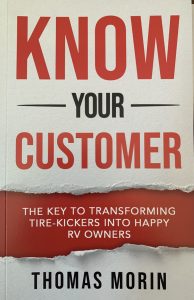Blog: Know Your Customer – Know Their Day
 Morin
MorinEditor’s note: This four-part blog series is taken from author, consultant and career coach Thomas Morin’s book, “Know Your Customer: The Key to Transforming Tire-Kickers into Happy RV Owners”. Subsequent blogs will run each Monday for the next three weeks.
Why do salespeople need to know their customer’s day?
It’s simple. People buy from people they like and trust. If you, as a salesperson, don’t try to understand what led them to your dealership and why, you won’t lay the groundwork for them feeling comfortable enough to like and trust you.
Life today is crazy and stressful, which affects customer mindset even before they walk in the front door of the dealership. Many have tentative, apprehensive thoughts and believe that you will try to sell them the RV that you or your manager wants to move – rather than one that is perfect for them.
Removing tension and anxiety early in the first few minutes of the visit is highly important. In addition, spending thousands of dollars on an RV (which is a luxury item and not a necessity) is an emotional decision for them and one that even adds more tension before they walk in one.
Unless you take steps to understand and condition your customers mindset in the first few minutes of their time with you, you won’t be able to make the necessary adjustments needed to help them feel comfortable. Helping them relax and feel comfortable is the first step on the road to achieving rapport and trust that is a building process below that starts before they walk in the door.
Empty Your Head
The resulting emotions of handling customers can have a carryover effect on salespeople. Some customers are an easy, comfortable sale, while others are the four-hour grinder that ends with “Mr. & Mrs. I want to think it over”.
Salespeople must manage these emotions so there is no carryover to the next customer – good or bad. No matter how busy you are, you must take 5 minutes to rest, regroup and refresh, so you can approach the next customer with what I call “an empty head.”
Nail the Greeting
Your initial greeting lays the foundation for open and honest communications. First impressions matter, as the customer will decide if they like you in a matter of seconds.
Walk too fast toward them and you will intimidate them. Walk too slow and you look creepy. Medium and steady is the best approach.
Make It About The Customer
We’ve all heard the saying “treat people like you want to be treated.”
In Tony Alessandra’s 1996 book “The Platinum Rule”, he outlines the importance of treating people “like they want to be treated”. In the early stages of the customer greeting, this is the exact mindset salespeople need to have.
Everything you do or say needs to be about the customer. Every word you say needs to build on something the customer just said. This shows the customer that you will listen to them and is the first step toward them being comfortable to give you honest information.
Assess Their Emotional State
Opening the door for customers to feel comfortable talking about their day can help you determine their emotional state.
Their stressful life issues need to be set aside before they can have a clear head to consider all the new information the salesperson will be giving them in the next few hours. Normal daily stresses before they walked in the door can cloud their mindset and stand in the way of a being open and receptive to what the salesperson will be telling them.
Reading Body Language
Knowing their day also means the salesperson needs to be much more perceptive of the non-verbal cues customers typically reveal in the first few minutes of the visit.
Most will be cautious, reserved, and quiet. While some may hold back information in the early stages of the interaction, being perceptive of their body language could reveal their true feelings and possible concerns.
Do they back up as you approach or step toward you to greet you? Do they appear calm and relaxed or uncomfortable? Do they look you in the eye or look past you? Do they expand their answers to your questions or give short, one- or two-word answers?
These non-verbal cues matter and will help you quickly piece together the information you need to make early adjustments to help your customer feel more comfortable.
Be a Question Box
They key is to get the customer talking and the best way is to ask non-threatening questions. The more they talk, the more comfortable they will feel.
Be a Chameleon
Taking these steps in the early stages of a customer visit can give salespeople cues as to adjustments needed in their personal style, leading to the building of rapport and trust.
If a salesperson is upbeat, loud and outgoing, it could easily make the nervous, timid customer feel uneasy and the whole selling process can stall before it gets started.
If the customer is excited, vibrant, wants to laugh and have some fun looking at RVs and the salesperson is introverted and quiet, it will quickly let the air out of the process and ruin the salesperson’s chances of selling to the customer.
People buy from people they like and trust – and they like and trust people who are like them. Making these subtle adjustments as a salesperson can up the odds of building the rapport and trust needed to make the sale.
 Thomas Morin is a veteran corporate executive, business owner and career coach. After joining Alpin Haus in Amsterdam, N.Y., Morin quickly became a top RV salesperson and was named trainer for all new salespeople in the dealership. He was subsequently promoted to sales manager, followed by director of employee development, training/coaching for all RV salespeople in the company. Morin is a certified life and career coach. For more information on Morin and his coaching business, visit his website at: www.unlockyourcareercoaching.com
Thomas Morin is a veteran corporate executive, business owner and career coach. After joining Alpin Haus in Amsterdam, N.Y., Morin quickly became a top RV salesperson and was named trainer for all new salespeople in the dealership. He was subsequently promoted to sales manager, followed by director of employee development, training/coaching for all RV salespeople in the company. Morin is a certified life and career coach. For more information on Morin and his coaching business, visit his website at: www.unlockyourcareercoaching.com



